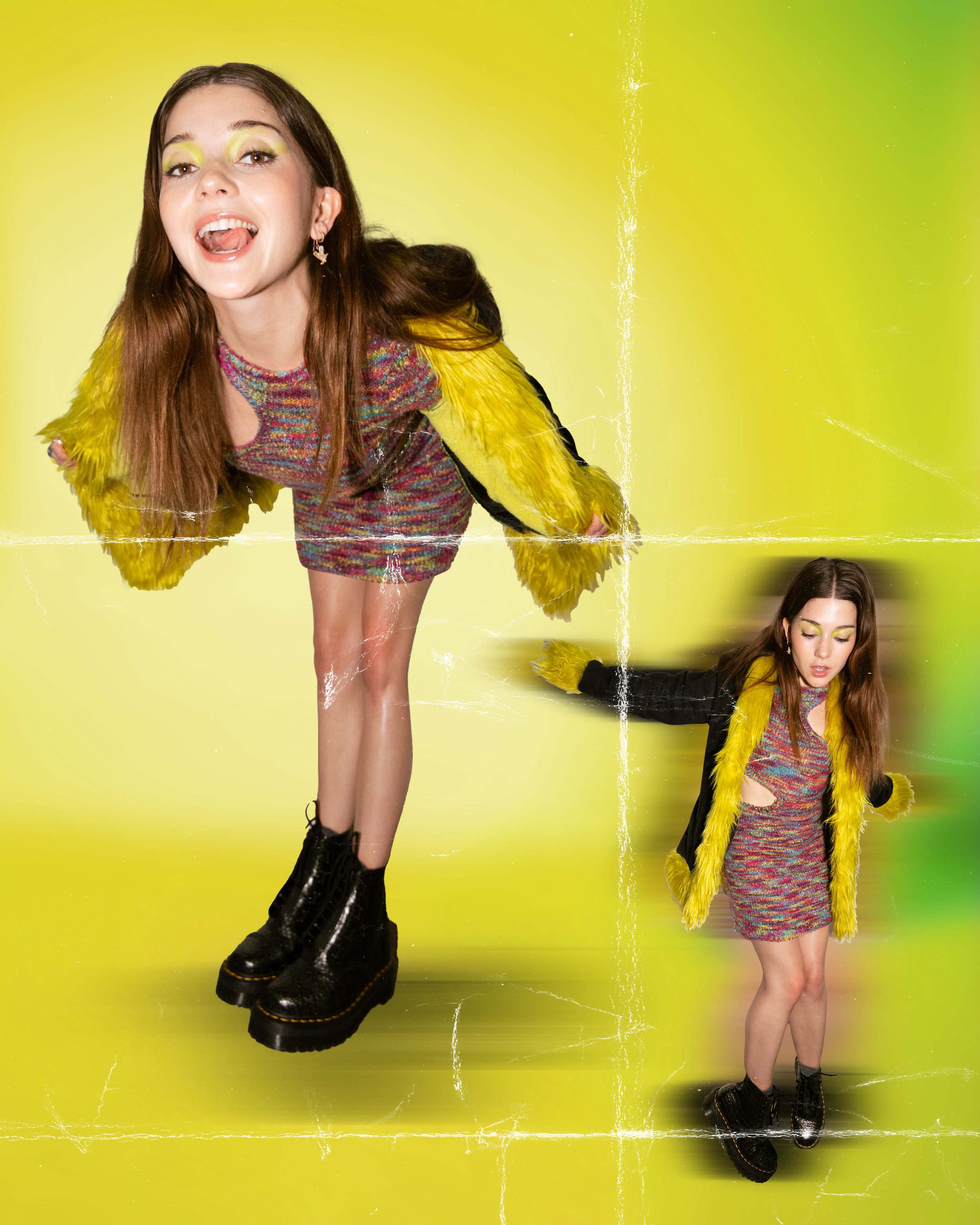Katie Douglas, Honestly
⤏ ACTOR KATIE DOUGLAS ON STORYTELLING, GROWTH AND BEING KIND TO HERSELF
⤏ IN CONVERSATION WITH GISSELLE PERNETT
⤏ PHOTOGRAPHY AND GRAPHIC DESIGN BY DANIEL HERMOSILLO
⤏ STYLING BY BRANDEN RUIZ
⤏ MAKEUP AND HAIR BY KATIE MANN
Katie Douglas is a self-proclaimed Busy Lazy Person. But, in less than 15 minutes of listening to her speak, you’d discover she’s only right about the busy part. Katie is currently working on a project in the middle of the woods, with an excitement to work behind the cameras in the future. Katie (a true Libra) is as intentional and passionate during our phone call as she is in her Netflix series, Ginny and Georgia. Whether she’s taking her audience through the best parts of high school or helping them find comfort through the worst ones, one thing is for sure: Katie Douglas will always be honest.
GISSELLE PERNETT: You started acting at a young age and had this lucky start. You’ve said in past interviews acting wasn’t something you were actively pursuing what made you change your mind?
KATIE DOUGLAS: It’s so funny. I feel like it's kind of something that fell into my lap. I wonder if it's because it was something that I was just attracting naturally. I think I found my place in all of this after. I left school — which was a place where I didn't really feel like I belonged because I didn't have a lot of things in common with other kids. It was in the creative industry that I really started to find my people and my voice and it turned out to be a really positive environment for me.
GP: Do you consider yourself a lucky person in general or a spiritual person?
KD: I consider myself a lucky person for sure. I'm very grateful for the opportunities that I've had. I’d say I'm spiritual in a lot of ways as well, I think. Time and time again I’ve proven to myself that I attract the energy that I put out into the world. I guess it's all about conjuring that mindful creative energy.
GP: Ginny and Georgia pretty accurately depicts high school culture. It doesn’t feel like a bunch of 30 year olds acting like high schoolers. Your character, Abby, has storylines surrounding eating disorders, parents divorcing, and issues with self esteem. What was it like playing Abby and how did you bring that character to life?
KD: I really wanted to tell that story with as much honesty as I possibly could. Keeping in mind the people who are watching and the people who were on the receiving end of those storylines. I know a lot of people can relate to Abby. If there wasn't any truth in all of this, then there wouldn't really be a point. I really just wanted to represent what it was like to actively go through [those experiences] and then hopefully down the line overcome them and find empowerment. Truthfully speaking, there's a lot of pressure knowing that you're speaking to teenagers who are actively going through hell in high school. Everybody knows it sucks. Nobody is who they want to be in high school, and it's kind of a really, really chaotic time. I really just wanted to introduce some honest storytelling and be there for people.
GP: Is there ever any pressure on yourself to make sure you do these characters’ stories justice?
KD: Totally. I put a lot of pressure on myself. After the first season, it took us by surprise how many people really responded to the show. The second time around — knowing how many people were watching and what my character meant to a lot of people — I made a deal with myself that, if we're gonna do this, then we're going to try and do it right.
GP: In contrast, how do you walk away from the character after a day of shooting hard to watch scenes. That scene in Ginny and Georgia where Abby tapes her thighs to make them appear smaller comes to mind.
KD: I don't know if you do walk away from the character. I'm actively growing as Abby grows. I learn things from her, and I add little pieces of myself into her as well. I do think when you're an actor, you kind of have to succumb to the endeavor that you put yourself through.
“Truthfully speaking, there's a lot of pressure knowing that you're speaking to teenagers who are actively going through hell in high school. Everybody knows it sucks. Nobody is who they want to be in high school, and it's kind of a really, really chaotic time. I really just wanted to introduce some honest storytelling and be there for people.”
GP: While playing so many characters and adopting different personalities, how do you stay true to who Katie is?
KD: That's a good question. I think I'm still trying to figure out how to stay grounded. I think the thing about acting is understanding how to be a good communicator. Even in my everyday life, I'm still trying to figure out how to be a good communicator, how to be a very honest storyteller, and figure out what honesty actually is. More than anything, I’m just letting myself be vulnerable and open to learning. [Being] mindful through all of it is the only way that you can stay in tune with that soulfulness [and] that character that you're trying to portray.
GP: One of the things I like about Abby is that she’s snarky, but deep down a good friend. Did you anticipate the audience having this love/hate relationship with her?
KD: I don't really know what I anticipated. I read the character a certain way and I saw somebody that I knew in her on the page. I was pretty much channeling this person that I was really familiar with in high school. I feel like everybody is really familiar with that character. They stand out, you remember them forever because they are so dynamic, and flawed but also enlightening, and relatable and funny. I don't think I knew that Abby was going to be that, to the extent that she was. I was really happy to find out that she was.
GP: What’s been the most difficult part of acting and what’s been the most rewarding?
KD: The most difficult part of acting is being looked at. I try to put that aside and have the audience disappear soI can be present in telling the story. That's kind of been my personal struggle. As I progress in the industry, [I’m] understanding what it is that I love about performing and acting and that might not be being looked at all the time. The most rewarding thing are people's responses to the story that you're telling and representing somebody. Representation is really, really, really important when it comes to storytelling. The fact that people can see themselves in a character or a story that you're depicting is incredibly rewarding.
GP: Now that you mentioned the hardest part is being looked at, do you rewatch the stuff you’re in?
KD: I do. I know a lot of actors probably don’t and for a good reason. I find the only way that I can correct myself and to do better in the future is to judge myself and watch my own progress. I think everyone will tell you [watching yourself] is the worst thing ever, but I guess the idea is — down the line — you'll be able to watch it, and be proud of yourself, and feel good about your performance.
GP: You’ve mentioned in interviews you were going to school for film studies and you’re interested in working behind the camera in the future. What type of stories do you want to tell and bring to the screens?
KD: I did go to film school. I feel like it’s so much more exciting to be the puppeteer rather than the puppet because you can tell the stories that are important to tell. It's really important to introduce more eclectic voices and tell stories of empowerment. Especially from [the] perspective of somebody who can recognize the inadequacies of empowerment, what it feels like to be powerful, and what it feels like to be powerless. A lot of the stories that are good are stories of empowerment, and growth, and emotion. That's something that I've always been really drawn to as an artist, being as honest as we possibly can about the good, the bad and the ugly.
“it’s so much more exciting to be the puppeteer rather than the puppet because you can tell the stories that are important to tell.”
GP: When will you know you’ve made it?
KD: I don't think I am someone who will ever feel like I made it. I'm taking advantage of the position that I'm in to the fullest. Just knowing that people are responding to what I’m doing and being on the receiving end of so much support is really reassuring. I guess the idea is that one day [I’ll] feel content with the art that I have made.
GP: Earlier you mentioned you’re hard on yourself. How do you show yourself grace?
KD: It's so important to be gentle with yourself and recognize that you are doing your best. I think a lot of it is just having empathy and having those conversations with yourself and treating yourself with the respect that you deserve.
GP: You have a lot of photos with your headphones and sometimes with a guitar. Is music something you see yourself pursuing one day? Are there any specific songs that have helped you get into character for any of your roles?
KD: Music is a huge part of my life and it totally is something that I do see myself pursuing down the line. It's just another form of communication in a totally different creative way. I’ve always made music so whether people hear it or not, I'll continue to. I incorporate music into my character prep so much. I make playlists for all the characters that I play. Right now I'm working on a project out in the middle of the woods and it's a story about isolation. I've got this playlist that consists of a lot of artists and albums that I think represent that really well. An artist named Grouper is someone who I absolutely adore right now and listening to her feels like you're listening to something that you shouldn't really be listening to, like she's telling you a secret. [That’s] been in my headphones a lot lately.
GP: What do you do when you’re not acting?
KD: I'm like the busiest lazy person ever. I am constantly creating and constantly just making stuff. I got into making quilts lately. I've made three quilts in the past year just because it was somewhere I could put my energy. I make music as we talked about earlier, and I also make a lot of visual art. I haven't really had a chance to let my brain rest much lately [but] that's also due to surrounding myself with a lot of really creative people who are always trying to make stuff, too. I've been helping friends with small production projects and auditioning and going to events. I've been really good at exercising my creativity.
GP: What’s the best piece of advice you’ve ever received?
KD: Probably just to speak up. It's definitely not unique to my own experience but growing up, I always felt like I had a habit of silencing my opinion and being a bystander. But it’s really important to use your voice and the platform that you have to speak up.



